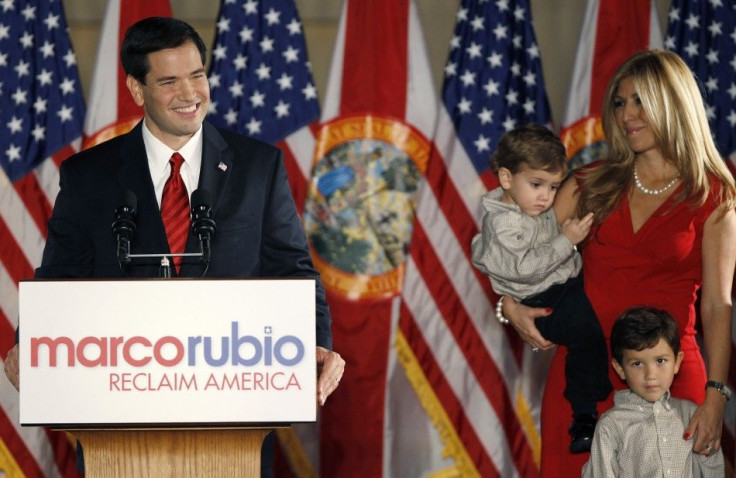Rubio, Clinton Could Be Presidential Game-Changers in Florida

The common wisdom is that next year's election will be a referendum on President Obama, but it could actually be the vice presidential candidates who decide the outcome, according to a Suffolk University poll of Florida voters.
The poll, released on Tuesday, showed that a generic Republican candidate would win Florida by several percentage points, 46 percent to Obama's 41 percent, if U.S. Sen. Marco Rubio, R-Fla., were on the ticket. But that lead would vanish if Obama replaced Vice President Joe Biden with Secretary of State Hillary Clinton, in which case the Democratic ticket would win Florida with or without Rubio on the ballot.
The hypothetical Obama-Clinton ticket led the hypothetical Republican-Rubio ticket 46 percent to 43 percent. Without Rubio, Obama and Clinton beat the generic Republican ticket 50 percent to 41 percent. The margin of error was plus or minus 3.5 percentage points.
Rubio Strong in Florida, Clinton an Answer to It?
In Florida, Marco Rubio is Superman, but Hillary Clinton is the kryptonite, David Paleologos, director of the Political Research Center at Suffolk University in Boston, said. Obama may have to grapple with his loyalty to his running mate Joe Biden versus his loyalty to the Democratic Party by fielding the strongest ticket possible.
If neither Rubio nor Clinton runs, Obama ties Mitt Romney at 42 percent and leads four other Republican candidates by varying margins: Herman Cain by 3 percent (a statistical tie), Rick Perry and Newt Gingrich by 7 percent each and Ron Paul by 12 percent. The poll did not include matchups between Obama and Michele Bachmann, Jon Huntsman, Gary Johnson or Rick Santorum.
Clinton and Rubio have both repeatedly said they are not interested in being vice president, but vows like that are rarely absolute. It is possible they would change their minds if a presidential candidate directly recruited them -- and especially if they believed they could be the difference between their party winning and losing, as the Suffolk University poll indicates.
Rubio, a first-term senator, is fairly popular in his home state, with 40 percent of voters holding a favorable opinion of him, 31 percent an unfavorable opinion and 22 percent no opinion. But Clinton's numbers are remarkable -- 64 percent favorable, 28 percent unfavorable and 9 percent no opinion -- and could make up for Obama's 45 percent favorable, 48 percent unfavorable rating.
Both she and Rubio have the ability to be game-changers in Florida, which Paleologos called one of the two most important swing states to win, along with Ohio.
2012 Election Forecasts
Putting personal opinions aside, 39 percent of voters said they thought Obama would win re-election, 33 percent thought a Republican would be elected, 26 percent didn't know and 2 percent thought someone other than the 12 candidates listed in the survey would win.
The survey also asked Republican voters who they would support in the Florida primary, and Romney (25 percent) and Cain (24 percent) were statistically tied at the top of the list, consistent with their front-runner positions on the national stage. Gingrich came in third with 11 percent, followed by Perry with 9 percent and Paul with 5 percent. No other candidate had more than 2 percent support.
A large number of Republican voters, 20 percent, remained undecided with just under three months to go before Florida holds its primary on Jan. 31.
© Copyright IBTimes 2024. All rights reserved.











